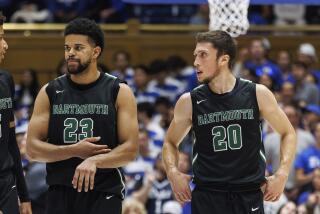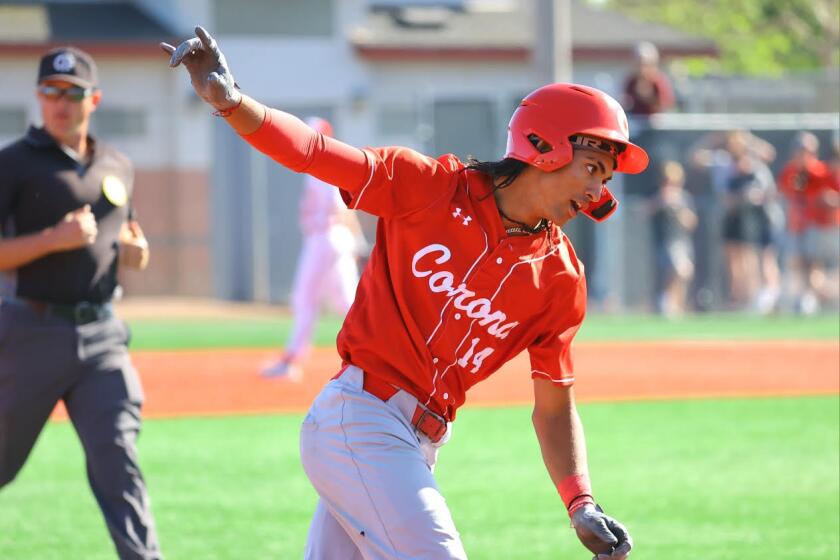NCAA CONVENTION : Coach K Strikes Out in His Bid to Rescind Limits on Basketball
- Share via
DALLAS — It has been a less than stellar week for Mike Krzyzewski.
Sunday, the Duke basketball coach saw his team lose to Georgia Tech, the Blue Devils’ first loss of the season.
Thursday, Krzyzewski suffered a more telling defeat--the rejection of his ideas by delegates to the 87th NCAA Convention.
NCAA Division I members voted down two proposals supported on the convention floor by Krzyzewski. One would have altered the number of coaching staff members in men’s basketball. The other would have delayed planned scholarship cuts in the sport.
Both measures would have rescinded reform legislation developed by the NCAA Presidents Commission and adopted by the NCAA membership.
Most of the proposals backed by the Presidents Commission on Thursday, designated as “Presidential Agenda Day,” were approved. Those measures included an ambitious athletic certification plan that will require Division I schools to review various aspects of their athletic programs at least once every five years.
The presidents did not prevail on every front. Delegates voted down a proposal that would have given the Presidents Commission the power to designate convention legislation that could not be amended for two years.
Beating the presidents at this game isn’t easy, however, a fact that became clear to Krzyzewski as he stated his case at the convention.
“I can tell you honestly that I am much more disheartened now than I was after Georgia Tech beat us,” he said.
Krzyzewski came to the convention as a representative of the National Assn. of Basketball Coaches, which has sought a greater say in NCAA policy making. To that end, the group hired Jim Haney, former Big West commissioner, to be its executive director last July and established its headquarters in Overland Park, Kan., less than two miles from the NCAA’s offices.
But Thursday’s events showed that, while the basketball coaches might be better organized, their thinking is not that of college presidents and other athletic administrators.
Division I delegates voted overwhelmingly against an NABC-backed proposal that would have limited basketball coaching staffs to four coaches, rather than the current standard of three coaches and one so-called “restricted-earnings” coach.
The concept of the “restricted-earnings” coach, limited to $16,000 in annual income, was approved at the 1991 NCAA Convention as one of several cost-cutting measures developed by the Presidents Commission.
Speaking on the convention floor, Krzyzewski said having such a coach provides another avenue for the unwanted influence of boosters. He noted that he was approached last summer by four Duke boosters, all of whom offered to provide jobs for his “restricted-earnings” coach.
“In my years at Duke, that had never happened with a coach,” he said. “I was scared.”
Also defeated Thursday was a proposal supported by the coaches’ group that would have delayed a reduction in basketball scholarships from 14 to 13 until the 1995-96 academic year. As part of the Presidents Commission’s cost-cutting plan, the 13-scholarship limit is scheduled to go into effect during the 1993-94 academic year.
At the same time, Division I delegates, recognizing the heightened awareness of gender equity within the NCAA, voted to restore scholarships that had been scheduled to be eliminated in 10 women’s sports, including basketball, starting with the 1993-94 academic year. As a result, the scholarship limit for women’s basketball will remain at 15.
In several instances, convention speakers mocked attempts to alter the men’s basketball regulations.
Said Bill Atchley, president of the University of the Pacific: “Should we even have four coaches? I see 13 players and four coaches--quite a ratio.”
When James Maxey, faculty athletics representative at Georgia State University, drew laughs from the delegates with a derisive comment about delaying the scholarship reduction, Krzyzewski became indignant.
“This is my first convention,” he told the delegates. “Now is probably not the time to talk about misconceptions. But the gap between the people in the field and the people making decisions is a wide one.
“I must say it hurts me to hear people joke about the number of coaches and hear laughing and clapping. You need a better understanding of what’s going on with coaches. We are trustworthy, and we are the closest link to why you are here--the student-athlete.
“If you don’t listen, that’s wrong. We understand who’s in charge. This is not about power. It’s about making decisions for student-athletes.”
More to Read
Go beyond the scoreboard
Get the latest on L.A.'s teams in the daily Sports Report newsletter.
You may occasionally receive promotional content from the Los Angeles Times.










